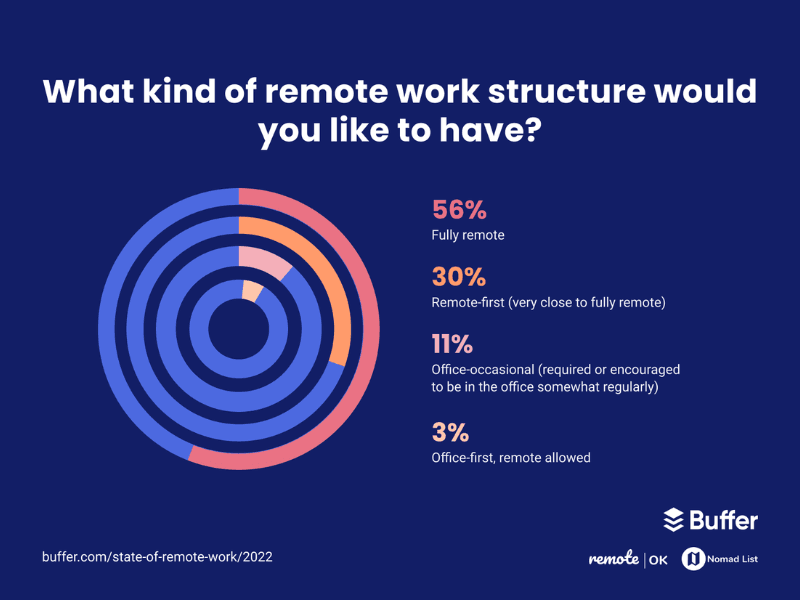Navigating the Shift to Remote Work: Ensuring Employee Engagement and Productivity
As the world shifts towards a more digital era, remote work has become increasingly popular among companies. Remote work refers to a working setup where employees can work from a location outside of the traditional office environment. This setup allows employees to work from anywhere, as long as they can access the internet. Although remote work provides advantages such as enhanced flexibility, improved work-life balance, and increased workforce diversity, managing the transition to this setup can be difficult, particularly in maintaining employee engagement and productivity. In this guide, you will find:
- The Shift to Remote Work
- Remote Work and Its Benefits & Challenges
- Tips for Managing Remote Teams Effectively, and so on!
The Shift to Remote Work
The shift to remote work started with the pandemic in 2020, but remote working existed long before that. Popular among freelancers, telecommuting, which means remote working, has been an effective way of working before COVID-19. According to a survey made by AND.CO (Fiverr Workspace) and Remote Year in 2018, remote working was already a hit, and 80% of employees who started to work remotely wanted have remote working options again.
However, the shift to remote working began with the pandemic, when it was not possible to work in any other working model, considering health issues. Before, if companies wanted to go fully remote, this would mean that they would have to take some risks since it was not a common way to work, and there was not enough data to support the benefits of working remotely. During and after the pandemic, after experiencing remote work themselves, seeing its advantages, and the fact that with the new advancements in technology, it was possible to work remotely, companies started to shift to a remote working style. According to Buffer’s State of Remote Work Study of 2022, 86% of employees want to work either fully remote or remote-first.

Image Source: Buffer
Remote Work and Its Benefits & Challenges
Remote work has several benefits for both employees and employers. For employees, remote work offers increased flexibility, better work-life balance, and the ability to work from anywhere. Remote work allows employees to avoid the daily commute, which saves time and money. This setup also allows employees to work in a more comfortable environment, which may lead to better productivity and job satisfaction. For employers, remote work offers a more diverse workforce, reduced overhead costs, and increased productivity.
Although remote work has several benefits, it also comes with its challenges. One of the biggest challenges of remote work is communication. Communication is crucial in a remote work setup. Remote employees may feel isolated and disconnected from their colleagues, resulting in poor communication and collaboration. Another challenge of remote work is team building. Building a sense of community and connection among remote employees can be challenging, notably when employees work from different locations and time zones. Besides the lack of communication and team building, remote work can blur the distinction between personal and work life, leading to burnout. Technical difficulties due to work equipment and internet connection may occur more in remote work, creating distress for employees.
Tips for Managing Remote Teams Effectively
Managing remote teams requires a different approach than managing traditional in-office teams. To manage remote teams effectively, employers should focus on building trust by providing regular feedback and setting clear expectations. Employers should also provide opportunities for virtual team building and encourage open communication among their remote employees. Employers should aim to build a positive workplace culture for managing their remote teams. A positive workplace culture should:
- help build trust
- increase engagement
- provide regular feedback
- set clear expectations
- improve job satisfaction.
To build a positive workplace culture for their remote teams, employers should create a sense of community among their employees. This can include encouraging open communication, providing opportunities for collaboration, and recognizing and celebrating the achievements of employees.

Image Source: storyset on Freepik
Training and Development for Remote Workers
Training and development are essential for any employee, but they become even more significant in a remote work setup. Remote workers may feel isolated and disconnected from their colleagues, and it can be challenging for them to learn and grow. To ensure that remote workers have access to the necessary training and development opportunities, employers should provide virtual training sessions, mentorship programs, and opportunities for networking and collaboration. Employers can provide effective training and development through the:
- Offering online training through various platforms.
- Providing mentorship and coaching to help remote workers feel supported and engaged.
- Encouraging self-learning by providing access to learning resources and professional development opportunities.
Employee Engagement Strategies for Remote Teams
Employee engagement is crucial in any work environment, and it becomes even more significant in a remote work setup. Engaged employees are more productive, more loyal, and more likely to stay with the company long-term. To ensure employee engagement in a remote work environment, employers should try to build relationships with their employees. Here are some of the things employers can do to ensure employee engagement:
Regular Check-ins: Regular check-ins can help managers stay informed about employees' progress, address any concerns, and provide support and guidance as needed. These check-ins can be done through video calls, phone calls, or instant messaging platforms.
Virtual Team Building Activities: Team building activities can foster a sense of community and collaboration among team members. These activities include virtual games, team quizzes, water cooler activities, icebreakers, trivia games, online happy hours, or other collaborative exercises that promote communication and teamwork.
Maintaining Motivation: Employee motivation is crucial for maintaining productivity and engagement. To maintain employee motivation, employers should focus on providing opportunities for growth and development to employees, and provide employees with necessary resources to do their jobs effectively.
Maintaining Productivity: Establishing clear goals and expectations. This includes setting deadlines and providing feedback on performance.
Celebrating Milestones and Achievements: Celebrating milestones such as work anniversaries, completing a project, or achieving specific goals by sending personalized messages, virtual shoutouts, or small gifts to acknowledge the employees' accomplishments.
Building a Social Community
Employee engagement is becoming more and more important for businesses. An effective way of creating engagement with remote employees is to build a social community. Creating a social community can be done by establishing a company culture where employees can socialize with each other. In a social company, each participant can communicate and build relationships, eliminating disadvantages of remote working such as isolation and lack of communication. At Guul, we believe that creating a social community is essential for a company's success. To ensure employees stay engaged, we provide social gaming solutions, polls, and quizzes within Slack and Microsoft Teams working spaces.
Future of Remote Work
Remote work has several benefits for both employees and employers, including increased flexibility and productivity. However, navigating the shift to remote work can be challenging, especially when it comes to ensuring employee engagement and productivity. By focusing on building relationships with employees, providing the necessary resources and tools, and creating a positive workplace culture, employers can help to ensure the success of their remote teams.
Remote work has become increasingly popular over the years, and it is likely to continue to grow in the future. A study conducted by Gallup reveals that more than 70 million workers in the U.S. alone say that their job can be done remotely, and 60% of employees want at least a hybrid working model. These statistics show that remote work is becoming more and more common and is likely to continue to grow in the future.


